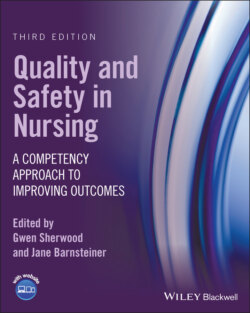Читать книгу Quality and Safety in Nursing - Группа авторов - Страница 83
Centers for Medicare and Medicaid Services
ОглавлениеCMS is a federal agency that administers Medicare, Medicaid, and CHIP. CMS utilizes other entities to survey health care institutions and programs for maintenance of minimum standards of quality, yet retains ultimate authority. CMS reports to HHS. Even though Medicaid services are provided by each state, CMS provides guidance for administering services and can audit the services provided to Medicaid recipients. CMS has several newly created offices as a result of the ACA, including the Center for Medicare and Medicaid Innovation and the Center for Dual Eligibles. CMS manages the Consumer Assessment of Healthcare Providers and Systems (CAHPS) for the MIPS. One of its newer initiatives, Patients over Paperwork, has looked to reduce the paperwork burden for providers while continuing to monitor for quality. CMS itself takes on great importance in the quality arena more broadly. The 2020 CMS quality conference drew over 3,500 attendees from across the country, and showcased the increasing involvement of CMS staff and contractors in quality measurement data analysis and reporting, and in engaging with the Meaningful Measures Initiative, the QIO 12th Scope of Work, and other efforts to embrace quality.
In approximately 2010, CMS, at the request of ANA leadership, created a Nursing Steering Committee that includes several CMS officials who are nurses, willing to address concerns that arise from external nursing organizations about Medicare and Medicaid reimbursement, service issues for Medicare or Medicaid recipients, and quality and safety issues. This Steering Committee includes a number of nursing organizations and continues to meet quarterly by conference call, addressing problems, new CMS initiatives, proposed rules, and most recently efforts to address the concerns of nurses in the field with regard to the COVID‐19 pandemic.
One of the key supportive features of CMS during the pandemic was its commitment to providing multiple weekly stakeholder calls to support the various health care workforce‐related issues that surfaced. Weekly nursing stakeholder calls were reported to be well attended, and CMS staff reached out to nurse leaders to provide advice to the front lines and hear their concerns during these calls, focused on addressing safety and quality of care.
CMS staff and leadership, in response to COVID‐19 and related emergency declarations, took steps to prepare and implement emergency rules. Several of these impacted nurses and APRNs. Scope of practice restrictions were lifted, depending upon the statutes in each state. Nurses who were willing to travel out of state to assist others in dealing with COVID‐19 workforce shortages had barriers such as licensure in another state lifted. Providers including APRNs, depending on scope of practice, were allowed to provide and bill for telehealth visits.
As policy efforts have shifted from passage of the ACA to defining the rules and regulations that impact implementation of its many provisions, the CMS Nursing Steering Committee continues to be extremely valuable in identifying opportunities for the profession to weigh in with public comment on proposed rules, and in calling to attention and advocating for changes to language that would disadvantage nursing practice or reduce nursing’s ability to keep patients safe. It continues to serve as a welcome venue for getting timely information about CMS initiatives that potentially affect the profession and consumers.
